2024: FPGAworld Stockholm and Copenhagen
Keynote Speaker Copenhagen
Keynote speaker: Ole Højrup, AMD Xilinx, USA
Title: Pervasive and Sustainable AI with Adaptive Computing
Abstract: In the context of AI, we face a plethora of challenges that extend beyond the widely discussed performance scalability required to meet the growing demands of compute and storage in the latest models. These challenges encompass sustainability, pervasiveness, agility, and diversity, all of which are needed to cater to a constantly evolving range of applications and algorithms from endpoint to edge and cloud. In this talk, we explore how adaptive devices and agile compiler stacks can provide solutions by delivering post-production hardware specialization and co-designed algorithms. This results in highly optimized AI systems which not only provide the necessary performance scalability but also bring a reduction in carbon footprint while addressing the needs of a broad range of diverse applications with the necessary agility.
CV: Ole Højrup is an experienced FPGA and SoC engineer with a Diploma degree from Engineering Academy Copenhagen in 1997 – today DTU Ballerup Campus. Ole has been working with FPGA’s all his career, first with Lucent Technologies and the last 24 years with Xilinx /AMD. He has expertise in FPGA designs, Embedded designs with a microprocessor, high-speed communication, AI, debugging HW and VHDL/Verilog code. As Senior Application Engineer Ole is working with direct customers in Nordic, and has great experience in Industrial, Medical, Robots, Video, Deferens and Datacenter applications.
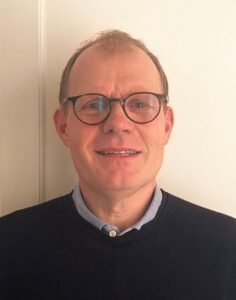
Keynote Speakers Stockholm
Keynote speaker: Stefani Eisele, EMEA Sales lead of the Altera – an Intel company, Munich
Title: Diversity of talent – Diversity of thought – hiring for effective teams
Abstract: This presentation will explore the key areas that FPGA suppliers must consider to succeed: industry-leading supply chain management, product leadership, and an up-to-date developer experience need to be enhanced by agile thinking to face our current unprecedented challenges. FPGA technology has 40 years of history andis still leading edge as it comes to innovation, differentiating IP and secure architectures. To continue our successful path, we need to innovate the appearance of our market: Inclusion, openness to diversity and flexibility for novel approaches will allow us to be attractive for young talent and succeeding with agile strategy deployments.
CV: Stefani is leading since 2023 the Programmable Solutions Sales Team in EMEA. Since 1997, she has worked in the security, communications and embedded market in Sales, Product Management, Program management and leadership roles. Stefani graduated from the University of Munich in Mathematics and Physics. More information: https://www.linkedin.com/in/stefanieisele/
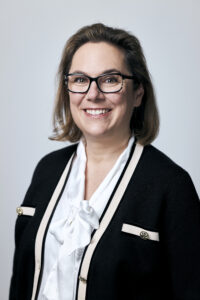
Keynote Speakers Stockholm 2024
Keynote speaker: Brian Colgan, Microchip Technology, UK
Title: The Intelligent Edge in the Post Quantum Era
Abstract: In the Age of the Intelligent Edge, artificial intelligence and machine learning are thriving throughout the network and continue to accelerate: Gartner expects more than 75% of enterprise-generated data to be created and processed outside a centralized data center or cloud by 2025.
The demands and threats for systems at the edge are formidable. The freedom to tailor designs for specific edge conditions is nonnegotiable. The attention to securing and protecting the valuable data and intellectual property now sitting at network endpoints must be absolute.
This keynote will document how the freedom and flexibility of RISC-V – the first truly open computing architecture – is enabling products that could never exist before. From mixed-criticality designs that blend real-time determinism with safety, atop a Linux-based foundation, to creating systems burdened by space constraints and collapsing power budgets.
It will also detail the dangers of being outside the data center in a post-Quantum world. Every system is assessed and attacked at the edge – where there are no guns, guards, or gates to protect it. So, there can be no cybersecurity without physical security. And it gets worse: Quantum computing breaks asymmetric cryptography.
CV: Brian has many years’ experience in the semiconductor industry, previously working in Xilinx’s research lab; as sales representative for Cypress Semiconductor; and as an FPGA FAE at EPS Global. He is currently a Business Development Manager in the FPGA Business Unit at Microchip Technology where he supports customers throughout Europe. Brian has a Bachelor of Engineering (Honours) in Computer Engineering from the Dublin Institute of Technology (now TU Dublin).
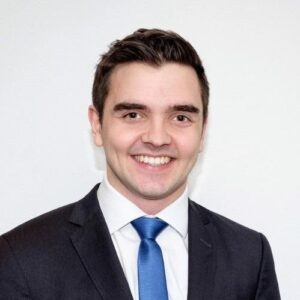
Your Content Goes Here
Sponsor, Exhibitors and Presenters 2024
DTU, Technical University of Denmark
AFRY, Sweden
Aktuel Elektronik, Denmark
AGSTU FPGA Education, Sweden
Xilinx – AMD, USA
Microchip, UK
ALTERA – Intel, USA
Achronix, USA
Lattice Semiconductor, USA
GOWIN Semiconductor, UK Ltd
Arrow, Europe
Trenz Electronic GmbH, Germany
Avnet Silica, Denmark
Xiphera, Finland
Efinix, USA
Synective Labs, Sweden
Linköping University, Sweden
Chalmers University, Sweden
KTH, Sweden
Malardalen University, Sweden
Istituto Italiano di Tecnologia, Italy
CERN, France
Siemens EDA, Germany
University of Birmingham, GB
SynthWorks Design, USA
BitSIM NOW/Prevas, Sweden
XJTAG, UK
Silicom, Denmark
Enclustra, Switzerland
Emlogic, Norway
Max-Planck-Institut für Physik, Germany
CEA-Leti, France
FPGAworld, Sweden
2023: FPGAworld Stockholm and Copenhagen
Program for Stockholm 2023
Program for Copenhagen 2023
Keynote Speaker Copenhagen and Stockholm 2023
Keynote speaker: Martin Kellermann , Microchip Technology GmbH, Munich
Title: RISC-V: Paving the Path Together to a Safe, Secure and Reliable Future
Abstract: RISC-V is an open-source instruction set that has created opportunities for companies of all sizes to innovate and make decisions independently. It is predicted to shape the future of computing for the next 50 years by providing a processor architecture that allows for more processing with a smaller carbon footprint, more features with less development resources, and new ways to combat threats with existing technologies. Companies are already utilizing RISC-V to develop applications such as High-Performance Spaceflight Computing (HPSC) processors. This keynote will explore how companies can benefit from this independence and how the ecosystems can enable easy adoption and scalability. It will also highlight companies that are already a part of this revolution and discuss how they can help create a safe and secure future. Through RISC-V, companies can reach their goals and protect their future. Together, we can move mountains.
CV: Martin Kellermann is an experienced FPGA and SoC engineer with a diploma in Electrical Engineering from the Landshut University of Applied Sciences. He has expertise in high-speed serial data transmission, signal integrity, and hardware debugging, successfully delivering projects in the industrial, automotive, and data-center domains. As Marketing Manager at Microchip Technology GmbH, Munich, he works with the European Sales and Field Application team to showcase the strengths of their FPGAs and SoCs.
Keynote Speakers Stockholm 2023
Keynote speaker: Mark Frost, Intel’s Programmable Solutions Group (previously Altera), England
Title: Key Factors for Success in Today’s and Tomorrow’s Markets
Abstract: This presentation will explore the key areas that FPGA suppliers must consider in order to succeed: industry-leading supply chain management, product leadership, and an up-to-date developer experience. We will examine the current supply chain landscape, which is facing an unprecedented imbalance in demand and supply, leading to long lead times and product allocations. We will also discuss the need for FPGA companies to make strategic investments to achieve product leadership and remain competitive. Furthermore, we will look at the importance of having up-to-date knowledge and skills, fast and appropriate EDA tools, the right SoCs, and the right RTL, SW, and hardware IP from generation to generation for FPGA developers to be productive. The presentation will then provide an overview of the different options available to FPGA vendors, preferred standards, and flows. Finally, we will look at how FPGA technology is being used in different parts of the world and provide a prediction of its future.
CV: Mark is the FPGA Security and 5G Technical Marketing Manager within Intel’s Programmable Solutions Group (previously Altera). Within this role Mark liaises between customers, sales and engineering teams worldwide for security and 5G communication topics, and works to create market awareness of Intel’s portfolio. During his 11 years with Intel he has held roles in both marketing and as a field application engineer covering programmable technology. Prior to Intel, Mark had worked for over 15 years in a variety of engineering roles, spanning telecommunications through to designing instruments for ESA satellites. Mark has a BEng in Electrical Engineering from the University of Plymouth.
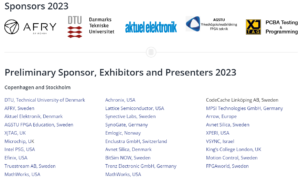
2022: FPGAworld Stockholm and Copenhagen
Program for Stockholm 2022
Program for Copenhagen 2022
Keynote Speaker Copenhagen 2022
Keynote speaker: Matti Tommiska, Xiphera Ltd, Finland
Title: Post-Quantum Cryptography and the Added Vallue of FPGAs
Abstract: If large-scale quantum computers could be built, they would be able to solve the hard mathematical problems that are the basis of the current public-key cryptography. Consequently, quantum computing poses a serious threat to the security of the Internet. Post-Quantum Cryptography (PQC) refers to cryptographic algorithms that can be implemented on traditional computing platforms – such as FPGAs – but are based on mathematical problems that remain secure even against quantum attacks. This talk reviews the status of PQC and discusses how the reprogrammability of FPGAs adds value during the multi-year transition period from classical algorithms to PQC.
CV: Matti has worked with FPGAs since 1995, when he started working as a researcher in the Electrical Engineering Department at the Helsinki University of Technology (nowadays part of Aalto University). He finished his Ph.D. thesis in 2005, and at the same time moved to work in the semiconductor industry, where he held both technical and sales roles at Spansion, Altera, and Intel. Since co-founding Xiphera in 2017 Matti has been the full-time Managing Director of Xiphera.
Keynote Speakers Stockholm 2022
Keynote speaker: Magnus Peterson, Synective Labs AB, Sweden
Title: FPGAs for Deep Learning applications – Trends, solutions, and tools
Abstract: Deep Learning has over the last years become a game-changer in many fields, adding extraordinary capabilities to systems and products. With strong competition from other technologies, FPGAs are in many cases a leading candidate platform for deep learning implementation, combining high performance, low power, and high flexibility. Seeing new high-volume opportunities, like automotive vision applications, the FPGA vendors have put large efforts into developing streamlined design flows for easy integration of deep learning inference engines into an FPGA design. This talk will look at the current trends and present different ways of implementing Deep Learning inference on FPGAs. It will also walk you through the different approaches taken by the different FPGA vendors and their different deep learning toolsets.
CV: Magnus has more than 35 years of experience from developing high performance embedded solutions, mainly within vision and image processing, where FPGAs play a key role. He has been with Synective Labs since 2003 and worked previously with vision-based industrial inspection systems at Innovativ Vision AB.
Keynote Speakers Stockholm 2022
Keynote speaker: Adam Taylor, Adiuvo, England
Title: Challenges we face in achieving FPGA safety and security
Abstract: According to the Wilson Group survey 84% of FPGA designs are released into the field with a non-trivial bug, in safety or security applications it can lead to injury, death, environmental impact, or a significant security breach. FPGAs are increasingly used for “commercial” applications such as IOT, autonomous driving, medical, and fintech. Worryingly only 52% of designs consider implementing security features and worse only 47% implement a safety-critical design.
The keynote will discuss the challenges we face in achieving safety and security on budget and schedule, and what are the key challenges which face us technical, personal, and community. How can we work together as a community to develop education, frameworks, and approaches which enable safety and security to be addressed in our developments?
CV: Adam is Chartered Engineer, Senior Member of the IEEE, Fellow of the Institute of Engineering and Technology, Visiting Professor of Embedded Systems at the University of Lincoln and Arm Innovator, Edge Impulse Ambassador, he is also the owner of the engineering and consultancy company Adiuvo Engineering and Training which develops embedded solutions for high reliability, mission critical and space applications. Current projects include ESA Plato, Lunar Gateway, Generic Space Imager, UKSA TreeView and several other clients across the world. FPGAs are Adam ‘s first love, he is the author of numerous articles and papers on electronic design and FPGA design including over 440 blogs and 30 million plus views on how to use the Zynq and Zynq MPSoC for Xilinx.

2020 and 2021: FPGAworld postpone to 2022
COVID-2019 Update
On March 11, the WHO (World Health Organization) has declared the assessment of the risk of spread and impact of COVID-19 to very high at the global level and Characterized as ‘Global Pandemic’.
As your safety is our top priority and concern, the Organizing Committee (DTU, AFRY and FPGAworld) decided to postpone FPGAworld 2020 event to next year.
2019: Program for Stockholm and Copenhagen
Keynote Speakers Copenhagen
Keynote speaker: Jens Stapelfeldt, Xilinx
Title: Did Europe miss the start in AI Technology?
Abstract: What does the Scandinavian AI landscape look like in comparison to other European and international countries, in which areas is progress already being made, and what can be done tomorrow?
Artificial Intelligence (AI) has been the megatrend in the technology world for several years now. This talk gives a short overview of the AI/ML (machine learning) landscape and where Scandinavia stands in comparison. One trend in AI technology is the integration of AI in “Edge” Devices, i.e. in the device on site! One focus of the talk is to show what is possible today with optimized CNN networks and what we can expect in the next generation. We will also discuss “how do we get 20TFOLP into an SSD network under 10W to run without going into the cloud and consuming hundreds of Watts”?
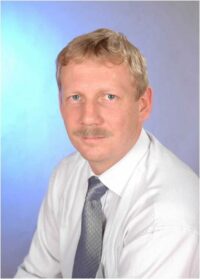
Keynote speaker: David Clarke, Intel PSG
Title: FPGA, the mainstream accelerator of choice for the FinTech Industry
Abstract: The increase in the requirement for greater levels of compute density driven by increasing regulatory pressure is critically driving the need for acceleration in the financial data-centers. For a many year’s, CPU’s have been the preferred processing engine because of their programmability and their faster implementation of algorithms. With the increased need for deterministic latency, near real-time option price and trends calculations the ultra-flexible FPGA is becoming the most efficient acceleration processing platform in Fintech. Alternative technologies such as GPU, struggle to deliver the performance, power and usability required to scale as an accelerator across data-center.
The presentation focus on how the barriers is removed paving the way for adoption of FPGA in FSI (Financial Service Industry) by developing high level abstraction financial libraries and frameworks to allow fast time-to-market development of OpenCL/HLS algorithms. The FPGA is becoming the mainstream accelerator in the FSI data-centers.
CV: David Clarke has experience in Business Development Manager, Financial Acceleration and Fintech, EMEA at Intel Corporation and long experience within the FPGA and applications in Fintech. More information: https://www.linkedin.com/in/david-clarke-a4b04b2/
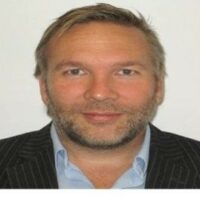
Keynote Speakers Stockholm
Keynote speaker: David Thomas, Intel PSG
Title: Where do FPGA’s outperform GPU’s
Abstract: David Thomas will talk about the big picture and market segments where FPGA based acceleration plays at its best! Is all about TCO (Total Cost of Ownership), Performance/Watt ratio’s from the Edge to the Datacenter (and back).
The latency, power efficiency and ability to handle various workloads will be the critical parameters defining the HW choices of our Users/customers. In addition to having an agnostic, high level SW tool.
CV: David Thomas started his career in 1996 as a Field Application Engineer for Altera within the distribution channel in Belgium. In 2000, he founded his own representative company in Benelux. In 2014, he joined Altera as Sales Manager Benelux to then moved to Munich in June’2015 to become the Area Sales Director of Altera for Central Europe (focus : Industrial, Automotive, ‘DataCentric’-Applications).
Since January’19, David is responsible for the EMEA PSG Channel partners.
More information: https://www.linkedin.com/in/david-thomas-838568/
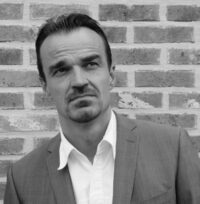
Keynote speaker: Madhav Chikodikar, Director of R&D, Synopsys, Inc.
Title: Build and Debug Highly Reliably FPGA-based Designs
Abstract: In today’s complex FPGA designs there is a need to integrate an ability to most effectively and economically deploy SEU mitigation and error monitoring circuitry in their FPGA-based systems targeting high radiation environments. In the overall design of a system, there is an opportunity to take advantage of triple modular redundancy (TMR) for creating an error detection and mitigation scheme. Important considerations include area and power increase, which affect system cost and can in some cases increase the probability of an SEU and the overall design performance challenges when applying the techniques. This presentation discusses the debug of these mitigation techniques available for different types of FPGAs. Also, the talk is about how complete some simple testing of voter logic and triplicates within the error detection and correction schemes. The combined capability of debug and fault injection allow developers to easily see each triplication and voter to verify and monitor whether the SEU mitigation techniques are working as expected. The last part is a discussion of future development to build highly reliably FPGA- based design.
CV: Madhav Chikodikar is Director of R&D with the FPGA software group at Synopsys, India. He has been working in the area of logic synthesis for FPGAs and ASICs for last 25 years. Madhav leads a team working on development of Synplify Premier and HAPS ProtoCompiler products. Prior to Synopsys, Madhav worked with Synplicity and SASKEN. Madhav‘s background includes logic synthesis and optimizations, timing analysis, ASIC prototyping and high reliability designs using FPGAs. Madhav is a senior member of IEEE.
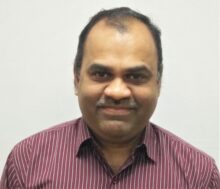
Sponsors

Sponsor, Exhibitors and Presenters
Copenhagen and Stockholm
DTU, Technical University of Denmark
ÅF, Sweden
Aktuel Elektronik, Denmark
Elektroniktidningen, Sweden
Dini Group, USA
Intel PSG, USA
Mentor – A Siemens Business
XILINX, USA
SILEXICA, Germany
GOWIN, China
Lattice, USA
Avnet Silica, Denmark
Avnet Silica, Sweden
Synopsys, USA
BitSim, Sweden
PyramidTech, USA
Blue Pearl Software, USA
Xiphera, Finland
SynthWorks, USA
VSYNC Circuits, Israel
Bitvis and CGI, Norway
Codiax, Sweden
Arrow, Europe
Silicon Labs, Finland
InnoFour, Netherlands
Synective Labs, Sweden
Blue Pearl Software Inc, USA
MathWorks, USA
Motion Control, Sweden
AGSTU FPGA Education (Yrkeshögskola), Sweden
2018: Stockholm 18 September and Copenhagen 20 September
The FPGAworld Conference is an international forum for researchers, engineers, teachers, students and hackers. It covers topics such as complex analog/digital/software FPGA SoC systems, FPGA/ASIC based products, educational & industrial cases and more. The academic & industrial tracks at FPGAworld, meals, premises, administration etc. is paid for by industry sponsors and exhibitors.
Download programs
Keynote Speaker, Stockholm and Copenhagen
Keynote speaker: Pieter J. Hazewindus, Synopsys, Mountain View, CA
Title: Advanced Verification and Debug for Large and Complex FPGA Designs
Abstract: The FPGA industry is in a period of rapid change. There has been a significant growth in size and complexity of FPGAs with each new generation. This has given rise to several challenges to FPGA design which are now needing a more ASIC “like” design methodology. We survey the implications for designers implementing FPGAs, IP designers, as well as the tools supporting the FPGA designs.
With the introduction of FinFET technology-based FPGAs, single-FPGA design sizes have taken a big leap, while the maximum operating frequencies have increased, and the power consumption has decreased dramatically. FPGAs have become more feasible as replacements for ASICs, and as stepping stones towards eventual ASIC implementations. The scale of integration challenges traditional testing methods, such as simulation. More complex clocking schemes require enhanced verification methodologies. And RTL debug of a multi-million gate FPGA design in reasonable time necessitates novel strategies.
Pieter Hazewindus leads the development of software solutions for the implementation of FPGA designs as well as ASIC prototyping on FPGAs at Synopsys. He is responsible for the Synplify Pro and Premier family of products, which have provided synthesis support for FPGA vendors since 1994. Prior to Synopsys, he held both managerial and software developer positions at Synplicity, Cogit Corporation, and Mentor Graphics. Hazewindus holds a Ph.D. in Computer Science from the California Institute of Technology and an M.S. in Mathematics from the Eindhoven University of Technology. More; https://www.linkedin.com/in/graham-copperwheat-5991755/
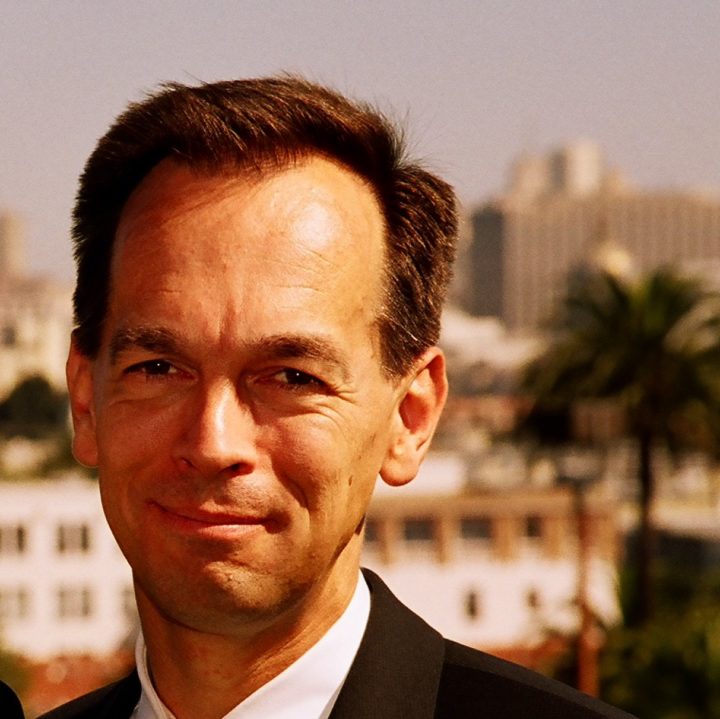
Keynote Speakers, Stockholm
Keynote speaker: Graham Copperwheat – Intel PSG located in UK.
Title: FPGA – The Multifunction Accelerator of ChoicePGA
Abstract: Recently, we’re living in an increasingly smart and connected world, a world that is generating increasing amounts of data and driven to find new ways to extract value from this data. A world that needs technology solutions that can not only meet today’s demands but also tomorrows. FPGAs are stepping up to meet this challenge by writing the next chapter in the story of their evolution – FPGA as a reconfigurable multifunction accelerator. What are the characteristics of this new chapter, what are the strategies the FPGA industry is deploying to address the demand?
More about Graham Copperwheat see: https://www.linkedin.com/in/graham-copperwheat-5991755/

Tutorials
Flyover Cabling Solutions for High Performance Interconnect for FPGAs (Stockholm)
Open for registration
Time: 13:45-14:45
Two compulsory registrations: send e-mail to Kevin.Burt@samtec.com and registration on the FPGAworld (max 12 persons).
As FPGA speeds increase to 56/112 Gbps PAM4, and the number of transceivers increase, so do the system design challenges. Signal integrity, thermal and packaging considerations place extreme constraints on the entire path out of the FPGA.
Traditional PCB routings are limited by the material resulting in shorter traces or more expensive exotic materials and layout challenges getting all the 56/112 G signals routed. As a result, the Interconnect Industry has created flyover cable solutions to enable these high bandwidth, high density links. These flyover solutions enable improved Signal integrity, low system power, and high performance, high density FPGA connections by taking the high speed signals off board and into low loss cables.
In this tutorial, you will learn the challenges of using traditional PCB layout techniques as well as the advantages of copper and optical cables as well as the system advantages that they enable.”
Sponsors
Exhibitors and Presenters
Copenhagen and Stockholm
ÅF, Sweden
DTU, Technical University of Denmark
Aktuel Elektronik, Denmark
Elektroniktidningen, Sweden
Dini Group, USA
Intel PSG, USA
InnoFour, Netherlands
Synopsys, USA
Microsemi, USA
Avnet Silica, Denmark
Avnet Silica, Sweden
Synective Labs, Sweden
Arrow, Europe
Trenz Electronic, Germany
Samtec inc. USA
Grazper, Denmark
Winbond, Taiwan
Shortlink, Sweden
Mentor – A Siemens Business
Bitsim, Sweden
Motion Control, Sweden
AGSTU education, Sweden
2017: Stockholm 19 September and Copenhagen 21 September
Download programs
Keynote Speaker 2017, Copenhagen
Keynote speaker: Hans Holten-Lund, Prevas AB
Title: Acceleration of Convolutional Neural Networks in FPGAs
Abstract: The keynote presentation will discuss some of the issues we face as FPGA designers when tasked with the computational loads involved in signal processing. New tools are appearing, aiming at making it easier to design signal processing blocks. Convolutional Neural Networks share many techniques with more traditional signal processing. Explore tradeoffs, design-time vs performance. Floating-point vs fixed-point math. GPUs vs FPGAs.
Hans Holten-Lund is a Senior FPGA Designer at Prevas, and has a Ph.D. and M.Sc. EE from IMM, Technical University of Denmark. He has worked mainly on FPGA design for phased array ultrasound scanners, and and other embedded FPGA based systems, including computer vision. Also has industry experience with multi-gigabit networks and 3D computer graphics. A longer CV is available here: https://www.linkedin.com/in/hans-holten-lund-a3a53114/

Keynote Speakers 2017, Stockholm
Keynote speaker: Brendan Farley, XILINX Inc.
Title: RF Data Converters in an All Programmable MPSoC FPGA
Abstract: Recent state-of-the-art FPGAs have seen the integration of multi-giga-sample RF data converters to address the requirements of next generation wideband digital communications system. The keynote presentation will give an overview of the RFSoC FPGA which integrates such functionality and will discuss some potential applications and future trends
Brendan Farley is a Senior Director of Engineering at US multinational technology corporation Xilinx Inc. where he is responsible for Analog and Digital-RF Research and Development. Brendan holds a Bachelor Degree in Electronic Engineering from Trinity College Dublin and a Master of Science Degree in Technology Management from NUI Galway.
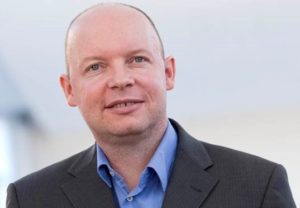
Keynote speaker: Hichem Belhadj, Chief Systems Architect – CTO Office, Microsemi Corp. USA
Title: Programmable Technologies: New Challenges and New Opportunities
Abstract; More to come
Hichem Belhadj has been with Microsemi for close to 20 years. He is currently the Chief System Architect at the CTO Office. Prior to joining the CTO Office, Hichem held executive management positions in Corporate Sales and Field Systems and Applications at Microsemi, Actel, IST, and INPG. Hichem holds a Master and PhD from the Polytechnic Institute of Grenoble, France.
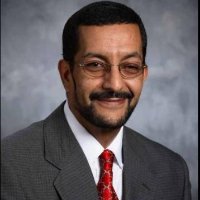
Thanks to the sponsors:
ÅF, Sweden
DTU, Technical University of Denmark
Aktuel Elektronik, Denmark
Elektroniktidningen, Sweden
ACM
ElektronikExpo
Exhibitors and Presenters
Copenhagen and Stockholm
ÅF, Sweden
DTU, Technical University of Denmark
Aktuel Elektronik, Denmark
Elektroniktidningen, Sweden
Prevas, Sweden
XILINX, USA
Linear Technology, USA
Dini Group, USA
Innofour, Netherlands
Avnet Silica, Denmark
Avnet Silica, Sweden
Synective Labs, Sweden
Microsemi, USA
Samtec inc. USA
Arrow, Europe
Motion Control, Sweden
AGSTU education, Sweden
Analog Devices, USA
Elmatica, Norway
2016 Stockholm 13 September
Download programs
Keynote Speakers 2016 Stockholm
Keynote speaker: Frank Förster, VP EMEA, Intel PSG.
Frank Förster is with Intel Programmable Solutions Group (formerly Altera) since 2007 in several positions. Prior to Altera, Frank Förster was working for companies in the field of Industrial Automation, Automotive as well as Digital Signal Processing. Frank Förster holds an engineering degree in EE/telecommunication.
Title: The Impact of Semiconductor Trends on future FPGA platforms
Abstract: This talk will first discuss semiconductor industry trends, then it will outline the profound implication the trends will have on future FPGA platforms across multiple vertical segments.
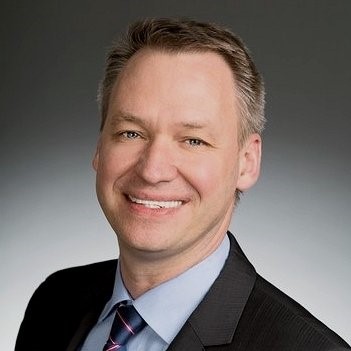
Keynote speaker: Mike Dini
Title: FPGAs — A Report from the Trenches
Mike Dini, an old FPGA veteran, will present his view of the present state of the FPGA industry. He will address the past, present, and future of the FPGA world.
2015 Stockholm 8 September and Copenhagen 10 September
Our sponsors

Program with more information
Keynote Speakers 2015 Copenhagen, Professor Vincent Mooney III, Georgia Institute of Technology, Atlanta, USA
Title: Hardware Security and FPGAs: Strategies and Counterattacks
Recent highly publicized security attacks on businesses and governments have heightened the awareness of hardware vulnerability to malicious attacks. FPGA technology offers a unique strategy not available to application-specific non-programmable hardware: reconfiguration. This talk will give an overview of recent results in hardware security including an approach based on hardware signatures. The ability of hardware reconfiguration to protect run-time hardware and software highlights the advantages of FPGAs.
Keynote Speakers 2015 Stockholm, Professor Ahmed Hemani, Dept. of Electronics and Embedded Systems, School of ICT, KTH, Sweden
Title: Next Generation Massively Parallel VLSI Architectures and Design Methods
ITRS for the mobile category has challenged the VLSI Design community to come up with solutions by 2020 to provide 1000X improvement in performance with 120% increase in power budget and no increase in the design team size to cope with a 10X increase in design complexity. We propose a solution based on Coarse Grain Reconfigurable Fabric for computation and storage called DRRA – Dynamically Reconfigurable Resource Array. This fabric provides a near ASIC performance and yet retains programmability. This fabric enables dataflow graphs along with their control to be implemented in arbitrary degree of parallelism in a true hardware fashion. The DRRA fabric also comes with a novel System-level to GDSII design flow based on a concept called SiLego. SiLego is based on a grid based design and use of large grain building blocks called SiLego instead of the prevalent standard cells. The SiLego blocks snap fit to compose a GDSII macro and provide a predictable micro-architecture level physical design target to empower true high-level and system-level syntheses.
Sponsors, Exhibitors and Product Presenters
DTU, Denmark
ÅF, Sweden
ACM
KTH, Sweden
Aktuel Elektronik, Denmark
Elektroniktidningen, Sweden
Exostiv Labs, Belgium
Linear Technology, USA
Silica, USA
XILINX, USA
The Dini Group, USA
Synective Labs, Sweden
Microsemi , USA
Arrow Electronics, USA
Altera, USA
InnoFour, Netherlands
ELMATICA AS, Norway
AGSTU AB, Sweden
2014
Keynote Speakers 2014 Hichem Belhadj, Microsemi Corp, USA
Title: Field Programmable SoCs: The Greatest Acceleration of the Innovation Race
Short Biography: Hichem Belhadj has been involved in the Programmable Logic Industry since the late 80s. He has been with Microsemi SoC (former Actel) for over 15 years. Hichem has recently moved to Microsemi Corporate to lead the Field Systems and Applications Engineering. He holds a Master and a PhD from the Polytechnic Institute of Grenoble.
Program
2013
Keynote Speakers 2013:
- Jonas Nilsson, Synopsys, USA. Title: Programmable Platform – The Cornerstone of Verification
- Mike Dini, Dini Group, USA. Title: FPGAs – Past, present, and Future. Notes from the past 25 years
- Prof. Koen Bertels, Technical University of Delft, Netherland. Title: From FPGA to Polymorphic computing








